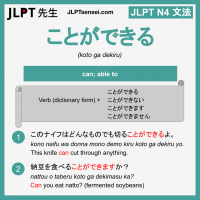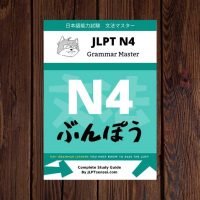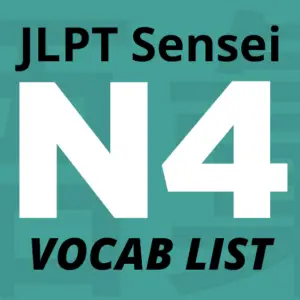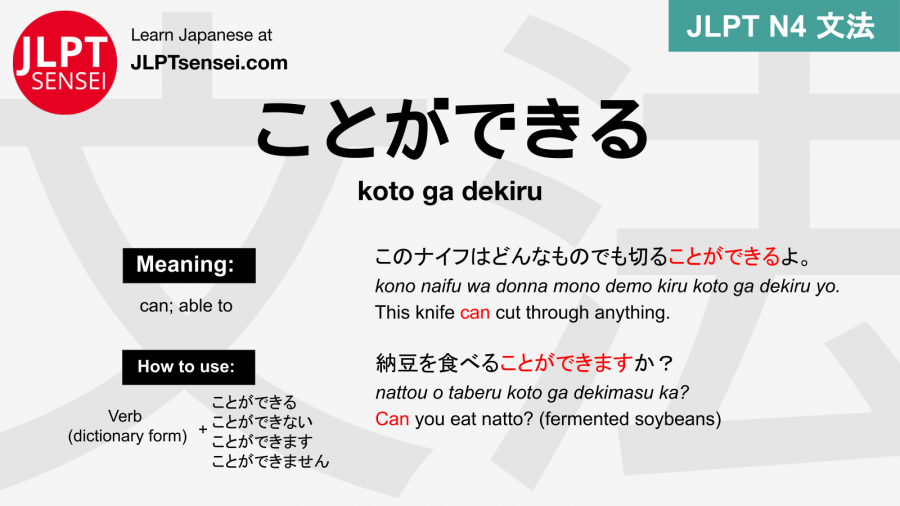Aprende gramática del idioma Japonés: ことができる (koto ga dekiru). Significado: can; able to; not able to.
ことができる (koto ga dekiru) is used to say something can be done or is able to be done.
It is basically the same as the verb’s potential form, but simpler to use.
Example A) «can do»
Let’s first look at the normal potential form for the verb たべる «to eat».
- たべる -> たべられる
- taberu -> taberareru
- «to eat» -> «I can eat»
This can also be written as:
- たべることができる
- taberu koto ga dekiru
- «I can eat»
Example B) «cannot do»
Let’s first look at the normal potential form.
- たべない -> たべられない
- tabenai -> taberarenai
- «to not eat» -> «I cannot eat»
This can also be written as:
- たべる ことができない
- taberu koto ga dekinai
- «I cannot eat»

Click the image to download the flashcard.
Download all N4 grammar flashcards.

Download our complete
JLPT N4 Grammar Master E-book.
Access ALL extra downloads, ebooks, and study guides by supporting JLPT Sensei on Patreon.
ことができる - Oraciones de ejemplos 例文
Cada oración de ejemplo incluye ayudas como la lectura (hiragana) en Japónes, la lectura en romaji, y la traducción en Español.
Da clic en el siguiente botón rojo para alternar todas las ayudas, o puedes dar clic en los botones individuales para mostrar únicamente las que desees ver.
Ejemplo #1
私は日本語を話すことができる。
Ejemplo #2
彼女は歌うことができる。
Ejemplo #3
このナイフはどんなものでも切ることができるよ。
Ejemplo #4
何も言うことができない。
Ejemplo #5
私は嘘をつくことができない。
Ejemplo #6
私は日本語を学ぶことができない。
Ejemplo #7
ここからは山を見ることができます。
Ejemplo #8
どこで手を洗うことができますか?
Ejemplo #9
納豆を食べることが出来ますか?
Ejemplo #10
彼らは私の日本語を理解することが出来ませんでした。
Vocabulario 語彙
| Kanji 漢字 |
Kana カナ |
English 英語 |
|---|---|---|
| 私 | わたし | I |
| 日本語 | にほんご | Japanese language |
| 話す | はなす | to speak |
| 彼女 | かのじょ | she |
| 歌う | うたう | to sing |
| 切る | きる | to cut |
| 何も | なにも | nothing |
| 言う | いう | to say |
| 嘘をつく | うそをつく | to lie |
| 学ぶ | まなぶ | to learn |
| 手を洗う | てをあらう | to wash hands |
| 納豆 | なっとう | nattou (fermented soybeans) |
| 食べる | たべる | to eat |
| 彼ら | かれら | they |
| 理解 | りかい | understand |
Ver todas las lecciones de gramática del JLPT N4



